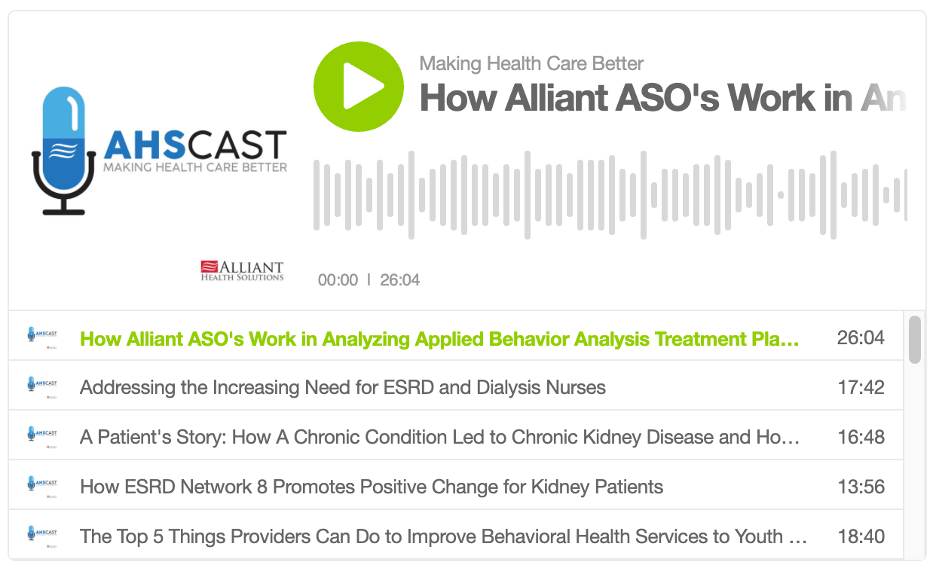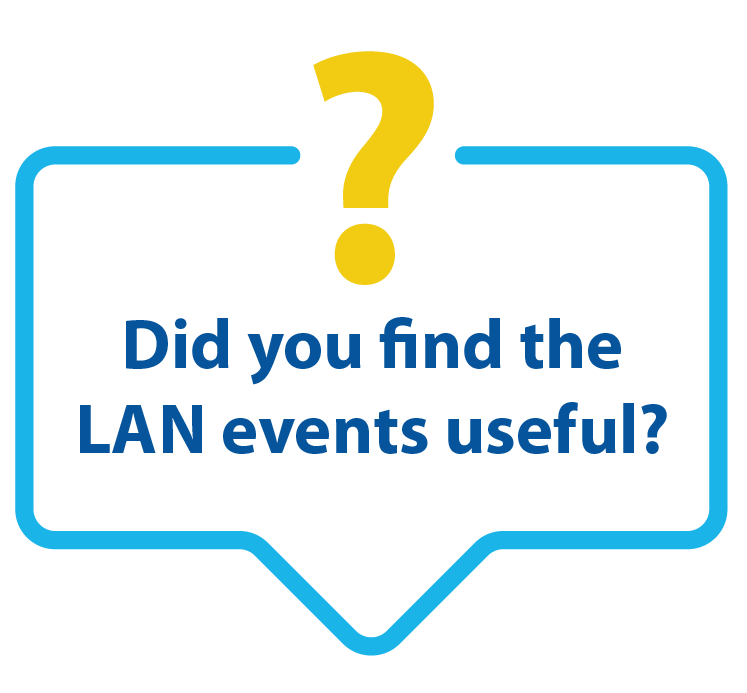|
|
|
|
Please share this email with friends or colleagues using these links:           
(Please do not forward the email as it may impact your subscription settings)
|
|
A monthly newsletter highlighting events and resources for Nursing Homes & Partnerships for Community Health
In This Issue:
|

Updated Guidance for Nursing Home Resident Health and Safety
To further support the implementation of the Long-Term Care (LTC) Facilities Requirements for Participation, published in 2016, CMS is issuing surveyor guidance that clarifies specific regulatory requirements and provides information on how compliance will be assessed. In addition, CMS is revising its guidance to state agencies to strengthen the management of complaints and facility-reported incidents. Learn More
|
|
|
|
Our team is collecting and curating the essential trainings, events, resources and vaccine updates about COVID-19 and other viruses on our website so you can find the information you need. We've also outlined the essentials below.
View All COVID-19 News & Resources
Training & Resources
- Take 5: Visit the Alliant Health Solutions website to find resources on COVID-19. We are currently working on a series of five-minute educational YouTube videos that focus on the most requested topics related to COVID-19 and the COVID-19 vaccine. Visit Website
The first four videos are ready for you and your staff:
- Take 5: Introductory – How to Use Take 5
- Take 5: Vaccine Eligibility Part 1
- Take 5: Vaccine Eligibility Part 2
- Take 5: Overcoming Refusals
- Visit the Alliant Health Solutions Give the Boost A Shot webpage for up-to-date resources, events, newsletter information and more, including social media graphics and flyers. Visit Website
- Visitor Talking Point—Visitor Flyer
- Attention Visitor Flyer
CDC Strengthens Recommendations and Expands Eligibility for COVID-19 Booster Shots
The Centers for Disease Control and Prevention (CDC) strengthened its recommendation that those 50 and older should receive a second booster dose at least four months after their first. Even though older Americans have the highest coverage of any age group of first booster doses, most received their last dose months ago, leaving many vulnerable without protection against COVID-19. Learn More
COVID-19 Workforce Virtual Toolkit: Resources for Healthcare Decision-Makers Responding to COVID-19 Workforce Concerns
The U.S. Department of Health and Human Services Assistant Secretary for Preparedness and Response developed a collection of training resources for decision-makers managing healthcare workforce challenges in response to the COVID-19 pandemic. Resources include COVID-19 Health Equity, Healthcare Workforce Training, Workforce Solutions from the Field and more. Get Resources
Alliant Health Solutions' Resource Compilation
Throughout our work as a strategic partner in the National COVID-19 Resiliency Network, Alliant produced several flyers, videos and educational sessions for communities across the United States and U.S. territories. Click Here for a compilation of all these resources available in one place.
|
|
|
Leadership Lessons
Words of advice from leaders on the front lines.
This month’s leadership lesson is from Janice Hidalgo, Regional Lead of Chronic Disease Management Programs.
Time to Review, Replenish and Recharge
Summer is the perfect time to prioritize your well-being and work towards preventing burnout. According to the World Health Organization, burnout is a syndrome resulting from workplace stress that has not been successfully managed. It’s characterized by three dimensions: feelings of energy depletion or exhaustion, increased mental distance from one’s job or feelings of negativism or cynicism related to one’s job, and reduced professional efficacy.
Anyone exposed to chronically stressful conditions can experience burnout. Still, workers in the health care industry, human services employees, first responders, and educational services are at higher risk.
As in 2020, American workers across the board saw heightened rates of burnout in 2021, and according to APA’s 2021 Work and Well-Being Survey of 1,501 U.S. adult workers, 79% of employees had experienced work-related stress in the month before the survey. Nearly three in five employees reported negative impacts of work-related stress, including lack of interest, motivation or energy (26%) and lack of effort at work (19%). Meanwhile, 36% reported cognitive weariness, 32% reported emotional exhaustion, and an astounding 44% reported physical fatigue—a 38% increase since 2019.
Vacation days don’t necessarily translate into a sense of relief. On the contrary, it can be stressful for some to return from vacation knowing that a pileup of emails is waiting for their attention. Employees often continue to check emails while on vacation, which may cause additional stress with family members competing for their attention.
So, what to do? Instead of waiting to go on vacation to relax, try to incorporate small changes in your routine that feel like bite-sized vacation activities even while you are working. My favorite one is committing to take at least one conference call a day to take outside while I walk my dogs. (This will not work if it's your turn to take notes!)
Here are some tips from Becca at HalfHalfTravel.com:
Go for a walk. There’s something truly refreshing about seeing green trees, grass, flowers or landscapes, no matter where you live. (And if you live in a desert, maybe you’ll see sand and cacti — that’s okay, too!)
Take breaks. Stamp out work-from-home burnout before you get there by making sure you take breaks. It’s one of the best ways to set a schedule for yourself.
Make yourself a rewards system. For example, if I have 10 emails to work through, I tell myself that no matter how long it takes, I have to get through these emails, or I can’t do yoga or start dinner. Reward yourself with tacos from your favorite restaurant or an hour-long FaceTime with an old friend. Use a constant system of rewarding yourself to avoid burnout and introduce positivity into your schedule.
Turn your breaks into relaxation. Dedicate time to meditation, yoga or even napping if that suits your productivity cycles.
Schedule time to cook. Cooking is therapeutic — at least, that’s what I learned once I gave in to start learning how to cook in my mid-20s.
Best Practice Corner
Each month Alliant Health Solutions collects exemplar practices from organizations across the seven-state region. Thank you for your leadership, creativity and perseverance.
Vax Matters Podcast Explores Facts, Myths, Misconceptions Around Vaccines
Vax Matters Podcast is a new podcast series from the Louisiana Department of Health’s Immunization Program. The podcast will produce 36 episodes that explore facts, myths, and misconceptions around vaccines. The first three episodes have launched and can be found on Apple, Google Podcast, Spotify, Audible, and other top platforms. Click Here to read more about the podcast and listen to the first three episodes.
North Carolina Helps Communities Spring Into Summer
The North Carolina Department of Health and Human Services launched the Spring into Summer initiative to keep North Carolinians safer, healthy, active and social. It’s a fun, flexible, community-centered approach to help every organization and individual stop the spread of COVID-19. Enrollees will receive a detailed guide for ways to participate and an introductory toolkit with easy-to-use materials—from flyers to giveaways—to help spring into summer. Learn More
Do you have a promising practice to share? Please reply to this email and we will feature you in an upcoming issue.
Health Equity Corner
Alliant Health Solutions' health equity lead, Rosa Abraha, curated the following health trainings, events and resources related to health equity. Check out the resources listed below.
- Video: Utilizing the Social Vulnerability Index to Identify Community Needs. Presented by Bruce Spurlock, MD, president and CEO of Cynosure Health. Watch Recording
- Study: Does Racism Impact Healthcare Quality? Perspectives of Black and Hispanic/Latino Patients. This study shows that Black and Hispanic/Latino patients who experience racism in health care report worse views on the quality of their care and lower trust in their clinicians. These findings suggest that eliminating racism at the organization and clinician level may improve quality of care for patients of color. Read the Study
|
AHSCAST - Making Health Care Better
 |
Everyone deserves quality health care.
Tune into the Alliant Health Solutions Making Health Care Better podcast every other Thursday as they interview guests committed to making health care better. If you are a health care consumer, provider, insurer, system or consultant, this is the podcast for you. View All Podcast Episodes |
|
Events
|
Upcoming Learning & Action Network (LAN) Events
- Combined Partnerships for Community Health and Nursing Homes: Live Discussion With a Patient/Caregiver: Lessons Learned, Best Practices and Resources to Reduce Readmissions
Thursday, July 28 at 12:30 p.m. ET / 11:30 a.m. CT (30 min.)
**ANCC Contact Hours Awarded**
Join us for a discussion with Peg, a semi-retired nurse and valued Alliant Health Solutions Beneficiary and Family Advisory Council member, as she shares her experience as a patient and a care partner. Learn about what's in our readmission reduction toolkit and obtain resources to engage patients and support safe transitions.
Register Now
Register for Upcoming LAN Events
Last Month's Learning & Action Network (LAN) Events
- Combined Partnerships for Community Health and Nursing Homes: Tampa General Hospital PFAC; Enhancing Inclusion of the Patient and Care Partner Voice To Reduce Readmissions
Recorded on June 23
In this webinar, a patient advisory coordinator and a patient and family advisor shared strategies and project ideas for engaging patient and family advisors in readmission prevention and reduction initiatives. Watch the recording or download the presentation to learn about the importance of patient voice inclusion and specific ways a Patient and Family Advisory Council can contribute to readmission reduction in hospital settings.
View Slides | Watch Recording
Watch Previous LAN Events and Bite-Size Learnings

Were You Able to "Use Tomorrow" What You Heard During the LAN Events?
If Yes, Click Below.
Nursing Homes LAN Attendees: Click here
Partnership for Community Health LAN Attendees: Click here
Upcoming Infection Prevention Shop Talks
- July 2022 Shop Talk Call
Thursday, July 21 at 2 p.m. ET / 1 p.m. CT (60 min.)
**ANCC Contact Hours Awarded**
Join the Alliant Health Solutions Patient Safety Team to get updates on the National Healthcare Safety Network (NHSN) system and CMS requirements. We will review the new Event-Level COVID-19 Vaccination forms that are now built into the NHSN application to manage person-level vaccination data. In addition, there will be a live question and answer session to help with your immediate needs. Submitting data accurately into NHSN will help you more confidently plan your risk assessments and quality improvement initiatives.
Register Now
|
Resources
|
|
National Minority Mental Health Awareness Month
National Minority Mental Health Awareness Month is observed each July to bring awareness to the unique struggles that racial and ethnic minority communities face regarding mental illness in the United States. The COVID-19 pandemic has made it harder for racial and ethnic minority groups to access mental health and substance use treatment services. Learn More
988 Suicide and Crisis Lifeline
On July 16, 2022, the National Suicide Prevention Lifeline (1-800-273-8255) will transition to an easy-to-remember, three-digit number (988). This represents an unprecedented opportunity to strengthen and expand the existing network of over 200 locally operated and funded crisis centers across the country. Learn More
CMS Chronic Pain Journey Map
The Chronic Pain Experience Journey Map highlights the most prominent barriers experienced by people accessing care and the influencers acting on providers, ultimately affecting the person with chronic pain, their quality of care, and their quality of life. Download the Chronic Pain Journey Map
 |
Access FREE expert guidance on this topic: Contact Tanya Vadala |
|
|
Sepsis: Skilled Nursing and Long-Term Care
Did you know that sepsis impacts over 1.7 million Americans each year, resulting in over 270,000 deaths? Nearly 87% of sepsis cases begin outside the hospital, and early identification and treatment in the post-acute setting is key to reducing morbidity and mortality. Click Here for free education with continuing education credits available.
Updates in NHSN as of June 30, 2022
LTCF COVID-19 Module
The June Up to Date Vaccination status training slideset is now available on the NHSN website. This affects both the Resident Impact and Facility Capacity (RIFC) pathways and the Weekly Vaccination Data Modules.
- For NHSN surveillance, the up-to-date status definition is located here. This definition is now used in both the RIFC and Weekly Vaccination Module. Reference the website at least monthly for updates to the surveillance definition.
Weekly NHSN COVID-19 Vaccination Data Modules:
We recommend using the new Event-Level (person-level) forms for submitting health care personnel and resident vaccine data into the Weekly Vaccine COVID-19 Module.
To track and upload the vaccine data, use the new Excel sheets found on the website. (Note: Check the website frequently for updates to the CSV templates).
Guide to reporting event-level (person-level) vaccination data:
CSV templates and examples files for residents of long-term care facilities (LTCFs):
CSV templates and examples files for health care personnel of LTCFs:
Variable description and file layout for residents and healthcare personnel of LTCFs:
Tip: Using the new event-level COVID-19 vaccination forms in NHSN’s Long-Term Care Facility Component can simplify the tracking and reporting of data on multiple booster doses and up-to-date vaccination status. For questions about any of these updates, email the NHSN Helpdesk at NHSN@cdc.gov with the subject line identifying the topic of the message.

|
Essential Resources to Help You Navigate NHSN
Weekly COVID-19 Vaccination Data Reporting & Training
Effective August 23, report health care personnel and residents who are eligible to receive the COVID-19 booster (additional vaccine).
Training slides (reference slides 9 & 20-23)
Who is eligible for the booster? Reference the CDC website for current considerations for use of an additional COVID-19 dose.
Watch Our NHSN Shop Talk Shorts Series!
We know you're busy. Our new video series answers the most common questions we receive regarding navigating NHSN in a brief way. Available videos cover the following topics:
View NHSN Shop Talk Video Series
|
 |
Access FREE expert guidance on this topic: Contact Amy Ward |
|
|
Talking to Your Diabetes Patients About Their Need for a Hepatitis B Vaccine
Global health organizations recognize July 28 as World Hepatitis Day. Global awareness campaigns focus on mitigating the spread of the various types of Hepatitis through prevention education and the promotion of timely vaccination against vaccine-preventable Hepatitis infections. One of the most prevalent vaccine-preventable types of Hepatitis among people with chronic diseases is Hepatitis B (HBV). HBV is a viral liver infection that spreads through direct contact with the blood and other bodily fluids of a person with the virus. People with HBV may not have any symptoms upon being infected and can live several years without realizing they have it until chronic damage has led to cancer, cirrhosis or liver failure. Some people may experience exhaustion, low appetite, abdominal pain, nausea and yellowing of the skin and eyes in the early stages of chronic infection or during an acute HBV infection. Learn More
According to the Centers for Disease Control and Prevention (CDC), people with diabetes are twice as likely to become infected with HBV and experience more serious health outcomes than others without diabetes. People with diabetes are more prone to exposure to the virus through skin breaks and contact with infected blood during improper blood glucose monitoring and foot care practices. The reuse, sharing and inadequate disinfection of diabetes care supplies, including blood glucose meters, insulin pens, syringes and podiatry equipment, especially among multiple users, can spread HBV. Be sure to discuss recommendations for the safe use and effective sterilization of diabetes care equipment with your clinical staff, patients and their care partners.
Keep these tips in mind to help prevent an HBV outbreak in your facility:
- Clean and disinfect blood glucose meters between uses.
- Always wear gloves and perform hand hygiene between fingerstick procedures.
- Avoid using the same fingerstick device, syringe, or insulin pen for more than one person.
- Follow proper infection control procedures to prevent cross-contamination of clean supplies with contaminated blood glucose monitoring equipment.
- Make sure podiatry equipment is properly sterilized before use.
- Ensure environmental cleaning and disinfection are done between podiatry patients.
The best way to prevent HBV is by being vaccinated against it! Suboptimal HBV immunization rates among adults due to previous approaches that imposed the need for HBV risk factor screening and disclosure to determine vaccination eligibility have prompted the CDC’s Advisory Committee on Immunization Practices to recommend universal adult HepB vaccination for people up to 59 years of age. The CDC recommends the HepB vaccines for people with diabetes, kidney disease on dialysis, HIV infection, infection with hepatitis C, or chronic liver disease, among other risk factors. The language of the updated recommendations also urges providers to offer the HBV vaccine series to adults aged ≥60 years without known risk factors, especially if they are unvaccinated, instead of only considering vaccination options for this age group upon patient request.
It is recommended that:
- People newly diagnosed with diabetes be vaccinated against HBV immediately after diagnosis.
- Unvaccinated adults aged ≥60 with risk factors for HBV infection be vaccinated against it.
- Unvaccinated adults aged ≥60 without known risk factors may also receive HepB vaccines.
Click Here for HBV Vaccination Recommendations and Resources
|
|
New Delirium Consumer Brochure and Posters
Alliant Health Solutions partnered with our Beneficiary and Patient Advisory Council to update and share materials to educate consumers on what to watch for and ways to support an individual experiencing delirium. The consumer materials are the newest resources in a comprehensive delirium toolkit available for download and use. Download Resources
|
Readmission Patient and Care Partner Interview Tool
Gathering the patient/resident and care partner perspective is essential for a comprehensive cross-setting readmission retrospective review, root cause analysis and readmission reduction strategy. Alliant Health Solutions worked with our Beneficiary and Patient Advisory Council on a tool designed to provide a framework for gathering the consumer perspective on factors that may have contributed to readmission from a nursing home or skilled nursing facility. This tool can be adapted for patients that readmitted from home, with or without home health services. Download Tool
|
Members of the Beneficiary & Family Advisory Council are our partners in making health care better. To join us in this important work, contact Mel Brown or submit this referral form.
Browse resources our council has worked on below:
Seniors’ Long-COVID Symptoms Often Overlooked, Confused With Aging
Long COVID, or new or ongoing health problems at least four weeks after a COVID infection, may hit seniors differently, with symptoms that mimic the effects of aging, leading to oversight or misdiagnosis. Read Article
Special Report: Telehealth and the Medicare Population: Building a Foundation for the Virtual Health Care Revolution
From 2019 to 2020, the use of telehealth by Medicare beneficiaries increased by over 6,000%. As the United States slowly emerges from the COVID-19 pandemic, this exponential expansion of telehealth and virtual care options is poised to change our nation’s health care landscape, with the enticing potential of improving access to care. Read Article
|
For archived issues:
Visit the News & Announcements section of the Alliant Health Solutions website.
 |
For more information about Alliant Health Solutions:
www.quality.alliantquality.org
Share this email with a friend or colleague:  
|
Connect with us!
    Click here if you'd like to share your corporate profiles with us and we'll connect with you!
Click here if you'd like to share your corporate profiles with us and we'll connect with you!
|
 |
|
|
|
|